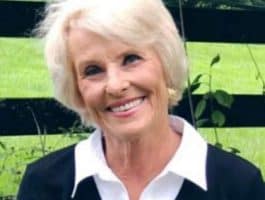
What Do I Do With My Disappointment?
As you look back on your parenting, do you often feel a twinge of regret? Barbara Rainey and Susan Yates talk about what to do when the high expectations you have for your kids don’t materialize.
Show Notes
About the Host
About the Guest
-
As you look back on your parenting, do you often feel a twinge of regret? Barbara Rainey and Susan Yates talk about what to do when the high expectations you have for your kids don’t materialize.
-
Dave and Ann Wilson
Dave and Ann Wilson are hosts of FamilyLife Today®, FamilyLife’s nationally-syndicated radio program. Dave and Ann have been married for more than 38 years and have spent the last 33 teaching and mentoring couples and parents across the country. They have been featured speakers at FamilyLife’s Weekend to Remember® marriage getaway since 1993 and have also hosted their own marriage conferences across the country. Cofounders of Kensington Church—a national, multicampus church that hosts more than 14,000 visitors every weekend—the Wilsons are the creative force behind DVD teaching series Rock Your Marriage and The Survival Guide To Parenting, as well as authors of the recently released book Vertical Marriage (Zondervan, 2019). Dave is a graduate of the International School of Theology, where he received a Master of Divinity degree. A Ball State University Hall of Fame quarterback, Dave served the Detroit Lions as chaplain for 33 years. Ann attended the University of Kentucky. She has been active alongside Dave in ministry as a speaker, writer, small-group leader, and mentor to countless wives of professional athletes. The Wilsons live in the Detroit area. They have three grown sons, CJ, Austin, and Cody, three daughters-in-law, and a growing number of grandchildren.
-

Barbara Rainey
After graduating from the University of Arkansas with a Bachelor of Arts degree in history, Barbara joined the staff of Cru® in 1971. With her husband Dennis, whom she married in 1972, the Rainey’s cofounded FamilyLife®, a ministry committed to helping marriages and families survive and thrive in our generation. Barbara is a frequent speaker and guest on FamilyLife Today®, FamilyLife’s award-winning nationally-syndicated daily radio broadcast. She is the author or coauthor of...more
Susan Yates
Susan Yates has written 15 books and speaks both nationally and internationally on the subjects of marriage, parenting, and faith issues. Her books include And Then I Had Kids: Encouragement for Mothers of Young Children; And Then I Had Teenagers: Encouragement for Parents of Teens and Preteens; Barbara and Susan’s Guide to the Empty Nest (with friend Barbara Rainey) and Raising Kids with Character That Lasts (With her husband John). Her two new books are...more
As you look back on your parenting, do you often feel a twinge of regret?
What Do I Do With My Disappointment?
Bob: You know the day when the kids' bedrooms become guest rooms? That is the day when a lot of moms experience a sense of loss.
Bob: Here's Barbara Rainey.
Barbara: Most of us don't look forward to dealing with loss, and loss is always unexpected. I mean, you know, whether it's getting sick with a cold, and you weren't planning on getting a cold this week, it didn't fit into your schedule, loss just doesn't fit into any of our plans, and so it's always unexpected, it always leaves us a bit stunned.
And so Dennis and I found ourselves feeling stunned and feeling lonely and feeling sad as we approached the empty nest.
Bob: This is FamilyLife Today for Wednesday, May 18th. Our host is the President of FamilyLife, Dennis Rainey, and I'm Bob Lepine. How does a mom process the emotions that come when the nest empties out, and what can a dad do to help? We’ll talk about that today.
And welcome to FamilyLife Today, thanks for joining us on the Wednesday edition. I'm trying to think, I don't know that I'd describe you as a big golfer. You play golf on occasion, right?
Dennis: I wouldn't describe me as a big golfer. I do play enough …
Bob: The last time you played, a couple of months ago, right?
Dennis: That's right.
Bob: And when you play …
Dennis: I get my money's worth. I get plenty of shots.
(laughter)
Bob: And there are times when you'll pull out the mulligan card and say "I want a do-over," right?
Dennis: Uh-huh, on the same hole.
(laughter)
Bob: I was thinking about that golfing metaphor because Mary Ann and I have looked at one another in the process of parenting, and we've thought, I wish they gave mulligans for parenting. I wish there were some do-overs in some of the experience of parenting.
Do you think everybody who goes through the parenting process looks back with some level of regret and wishes they could kind of do it again knowing what they know now?
Dennis: I feel like the average parent can look back and say, "I have a few regrets, maybe more than just a few," and that's because they started out with a lot of ideals and a lot of idealism and a lot of expectations, and when you have high expectations and ideals, and you don't achieve them all, that's called disappointment.
Bob: And we're talking to a couple of moms who have written a book called Barbara and Susan's Guide to the Empty Nest. We've got your wife, Barbara Rainey, who is with us again. Barbara, welcome.
Barbara: Thank you, Bob.
Bob: And Susan Yates, who also joins us and, Susan, welcome back.
Susan: Thank you.
Bob: I 'm wondering about this sense of wishing you had a few mulligans. When you get to the empty nest, when you've launched the kids and parenting, for all intents and purposes, it's not over, but it's different, it's completely different. Do you look back and go, "I wish I could do it all over again knowing what I know now?"
Susan: I think you're too exhausted.
(laughter)
You're too exhausted to want to do it all over again, but I think every parent, if they're really honest, has regrets, because we mess up. We're basically sinful people, and we are going to mess up, and that's why we need God's grace.
Dennis: Susan, why did you have this chapter in the book? I mean, a chapter on disappointment that follows a chapter on loneliness – why this subject?
Susan: Well, because, you know, we wouldn't be dealing with the real issues that we experience if we didn't deal with disappointment, because all of us have disappointment, and all of us have loneliness. I want to say quickly, though, the book is not a downer. We get on to the really fun stuff as well, but until we are willing to be honest about what life is really like, we're not going to relate to anybody.
There's a lot of fluff out there, and Barbara and I didn't want to write a book about fluff. We wanted to write a book that was honest about what people go through when they experience the empty nest.
Bob: Barbara, you hit the empty nest at a time when you were experiencing challenges as parents, and some of this sense of disappointment was very real for you, wasn't it?
Barbara: Yes, we did. Dennis and I were almost at the empty nest. We were nearing the finish line of the parenting journey, and one of our daughters became a prodigal, and she made choices that we did not approve of. She hung out with kids that we didn't approve of and would not have chosen for her if she had asked for our opinion.
And she just made some pretty poor decisions her junior and senior year in high school, which culminated, for us, in her decision to drop out of high school three months shy of graduation, which just made absolutely no sense from a parents' perspective. Why would you stop the race, so to speak, just shy of the finish line? I mean, three months is not very much to finish, and she could have had a high school diploma. But where she was, that was not important to her anymore, and so she dropped out of high school. And one of the things we discovered was how much that affected us just as who we were as people.
Not only did we experience some feelings of failure, we felt disappointed, we felt loss, but, all of a sudden, at a time in life that is supposed to be such a positive, joyous experience, we were sitting home alone when all of her peers and their parents were at graduation or were celebrating prom or were having after-graduation parties.
The church always has a graduation celebration, and we could attend none of those when, just a few months prior, we had been planning to be at all of those events. So it left us at a real sad season in our life that we hadn't anticipated.
We realized, Susan and I did, as we wrote this book that it may not be a parenting issue that finds you arriving at the empty nest with a lot of disappointment. It could also be an issue with your parents' health that gives you a lot of sadness as you approach the empty nest.
It could be your own personal physical health. I have a very good friend who developed bone marrow cancer the summer that they were getting ready to take their youngest off to college, and so she entered the empty nest and entered chemotherapy at the same time.
So there are a lot of women that we have talked to who have experienced a wide range of disappointments in their lives at the same time that the empty nest began.
Bob: And this is supposed to feel kind of like a time when you're crossing the finish line in victory.
Barbara: Yes, and that's what we all think.
Bob: You're sprinting toward the – I remember, in cross-country – I ran cross-country – believe it or not – ran cross-country in high school. Looking at me, I know you find that a little hard to believe.
Dennis: No, no, I believe that, Bob.
Bob: But I would run these two to three-mile races, and in the middle of the race, I'd get tired, and I'd slow down, but when you saw the finish line, you picked up your pace, and you kind of – the crowd's cheering, and that's – as you approach the empty nest, you think that's how it ought to feel.
We're getting toward the end, and we want to stretch out and be there, and when you get there with this kind of disappointment in your background, it can just deflate the whole experience, can't it?
Barbara: It really does, because not only are you dealing with the change in your identity as we've been talking about, but you're dealing with loss. And most of us don't look forward to dealing with loss, and loss is always unexpected.
I mean, whether it's getting sick with a cold, and you weren't planning on getting a cold this week, it didn't fit into your schedule, loss just doesn't fit into any of our plans, and so it's always unexpected, it always leaves us a bit stunned. And so Dennis and I found ourselves feeling stunned and feeling lonely and feeling sad as we approached the empty nest.
Dennis: Barbara and I have some high expectations of one another and of our kids and …
Barbara: Of life, too.
Dennis: Of life, and I think it's the way God hardwired us, I mean, it's who we are. And when you do have those high expectations, and those expectations go unmet either for yourself, for your goals, for your physical well-being, or for your children and how well they are doing, then the difference is called "disappointment."
The empty nest gives you a chance to stop and gain perspective. The problem is, is if you stop and gain perspective, and you're in the middle of a hurricane, and it's a storm, and it's coming at you from all different angles, and you're not quite sure how to interpret everything that's happening.
Well, I'll give you an illustration – when we dropped our youngest off at college – I mentioned earlier – on an earlier broadcast, that I was going to cry with my daughter, I was going to pull around the corner after I dropped her off at college, and I was going to get out of the car and do a whoopee and click my heels twice together and go off on a honeymoon with my wife – a second honeymoon.
In fact, Susan, we kind of picked this up from you and John. You guys said when you became empty nesters that one of the things you did was you had a getaway. You got away for a couple of weeks together, and so Barbara and I had this planned.
But our getaway was bittersweet because one of our little sheep, one of our little lambs, was not doing well, and any mom, any dad, any parent who really cares about how their children are doing who ends up watching them make choices that aren't the best and, in some cases, foolish, that's a huge disappointment.
So here Barbara and I were on what should have been a magnificent two-week getaway together alone, finally empty nesters. I'd have to say we used a good bit of the two weeks to grieve.
Barbara: Well, yeah.
Dennis: And to just experience sadness together.
Barbara: I agree.
Dennis: Because it wasn't, as you mentioned, Bob, finishing the race at the finish line with your arms outstretched with a smile on your face. We felt like, in some ways, we were being pushed to the finish line, and the results were not all that glorious.
Bob: Susan, I was having a conversation with one of my children, one of my adult children, and was talking about some of the sense of regret and disappointment that, again, all of us go through as parents, and I remember her looking at me and saying, "Dad, forget regret."
And she was trying to say “Don't dwell there, don't live there,” and I said to her, "Sweetheart, that's a little easier said than done," but then I pulled back, and I said, "She's really right. If you dwell in that whole season of disappointment and regret, if that defines how you look at this next chapter of life, it's going to be a lonely, hard, depressing chapter, isn't it?
Susan: It is, and, you know, I think one of the things we learn when we deal with disappointments or when we're in a hard place, is to give thanks in the middle of being in the hard place. The Scriptures don't say give thanks for things but in the middle of things and, Barbara, tell them about what you did, because I love what you did in the middle of this time.
Barbara: When we were struggling with our daughter, and she was in the midst, really in the thickest part of her rebellion, there was about a month timeframe that I just – every day when I got out of bed, I just felt like I couldn't go on.
I remember, I hand-lettered a verse on a piece of paper, a 3x5 card-sized piece of paper, and I taped it to my steering wheel, because I spent so much time in my car, as most mothers do.
But I remember getting in my car every day and reading that verse, and the verse was out of the Book of James, chapter 1, where it said, "Consider all joy, my brothers, when you encounter various trials, knowing that the testing of your faith produces endurance." I read that over and over and over again, because my emotions were just screaming at me that we had lost her; that we were failures; that we would never be able to recover. It felt so black during that period of time. There seemed to be no hope.
I just said that verse over and over and over again, especially the phrase “knowing that the testing of your faith produces endurance,” because I had to have something to hang on to that was positive, and that phrase gave me hope that God was going to do something positive, and he was going to build endurance in my heart even though I might not see it at the time.
I didn’t know when it would show up, but that scripture promised that God was going to build endurance from your trials. I literally read that over and over and over again almost every day for a month, and it became strength to me, and it became courage to me that God was at work, and that He was going to bring good out of this.
Dennis: Thanksgiving, in the midst of a trial.
Susan: Thanksgiving in the midst of a trial, and, you know, one of the places that I have found so helpful to experience that, as well, Dennis, is in the Book of Psalms, because David is so honest about the Psalms, and the pit, and the valley that he walks through, and yet he turns back to God over and over again.
So, on the one hand, he identifies with your disappointment, whether it's health or enemies or failures or sin, no matter what it is, and yet, on the other hand, he gives you the hope, the hope that Barbara was mentioning; the hope that God will be victorious in this.
I have found in my life, as I experience disappointments, and many of the friends that we write about, that one of the most important things to do is to be in the Word of God and particularly to go to the Psalms for comfort.
Dennis: When Barbara and I were going through this period of time, it is possible to give thanks. What is a challenge, at points, is to maintain that perspective. It can be elusive sometimes because it feels like trying to grasp a cloud. Because suffering can just come at you like waves hitting you, one right after another, and it can take your breath away.
And even though you know the Scripture, and I think that's why what you said is so important, Susan, is getting back in The Book and being reminded what the truth is. Keep going back to it, keep going back to God, and when you find your heart losing hope, you go back, and you give thanks again, and you remind your spouse to give thanks, and Barbara did that with me, and I also reminded her from time to time.
But the empty nest really can be a time of great celebration, but it can also be a time like we're talking about here, of great disappointment.
Bob: I'm thinking about folks who would be listening who would say, "Well, we didn't just have a prodigal, but none of my kids are walking with Christ today." Or maybe I look back on my own parenting, and I didn't know what I was doing and I didn't do the kind of job I wish I could have done.
It can be a season that's very introspective and, again, if you stay there in the introspection, it can put you in a cave that will leave you depressed for a long time.
Barbara: But that's the hope of the Scripture, is that God can work all things together for good, and so while the empty nest can be a season where we do a lot of introspection, where we do look back at what we've done and how we've lived our lives, the hope is that as we do that in light of God's word, God can lead us to make those relationships right; to reach out to people.
God wants to continually be at work in our lives, and so I think that it's a season that has a lot of promise to it, because if we honestly look at where we've been, God will lead us through to a new place that's better.
Bob: Susan, there are two pictures in the Old Testament that describe what Barbara is talking about that always come to my mind. One is where Isaiah says that God makes beauty from ashes. And you stop and think of ashes, and you think, "You can't make anything beautiful out of a pile of ashes.” There is no shape, there is nothing, but God makes beauty from ashes.
And there is another passage in the Old Testament where it talks about God being able to restore the years that the locusts have destroyed the crop, and those are the kinds of things that somebody in the empty nest. You can be honest about your regrets and your disappointments, but you've got to know that God isn't stuck with those. He can do redeeming things in you and in your children, and you've got to have some hope for that, don't you?
Susan: You do, and you have to remember that the story is not finished yet. God is not finished, and God does what's best, not necessarily what's fast, and we're all in a hurry.
Dennis: Or what's easiest.
Susan: Or what's easiest, this is right. Another promise right along those lines is Luke 1:37, which says, "For nothing is impossible for God."
Dennis: Also, Romans 8:28, which Christians can sometimes use as slang, "All things work together for good to those who love God; to those who are called according to His purpose."
Because we don't see the end, I think, many times, we can get caught up in the now. I know when Barbara and I went through a period of what turned out to be three or four years. I mean, this was not a two or three-month period that we went through with our daughter.
It's easy to forget the promise of Scripture that God can and does use these times to do something new. I was just out in Southern California, where there were fires, and there were huge areas that were burned completely by those fires out there from last fall. It's interesting that now that the rains have started to come that there is fresh growth bursting through the ashes, and I think that's what God wants to do in our lives. He wants to use the faith that Susan called us to and explained so well – to give thanks in all things.
But He wants us to step out in faith and trust Him and get to know Him and His Word and, in the midst of that, He does produce that character; that the trials we face do produce a character that does endure.
Bob: And as we've said, this book is not primarily a book about those disappointments, and those regrets, but you've got to acknowledge the reality of that if you're going to get to the place of joy and hope and excitement. This is a season where both of you – you're experiencing some of that joy, aren't you?
Susan: We are. It's a good season and, you know, God is there in the disappointments, and He's there in the joys.
Barbara: That's right, and we really are discovering, as we've been into it a few years, that the fun is growing. It's a transition, and we're often way too impatient with the transition. We expect it to be instant, and it's not. And the longer you're in it, the more joy and the more fun there is to discover.
Dennis: I think God gives us different seasons and different experiences as we move into those seasons and, you know, the key thing we need to just always check in our own lives is are we walking by faith? Do we believe that God's in charge? Is the truth of the Bible – does it represent the blueprints for how we're handling what comes at us because, you know, the empty nest season, as a season goes, is really a time that will have some losses, as Barbara said.
There are health issues, there are issues with our parents, we're going to experience some losses as we watch our kids grow their families and raise their families. So we have to know how to handle disappointment, and we have to know how to walk by faith, and that's why what you're doing today is extremely important because what you're practicing today will become your habits later on.
Bob: And what you’re preparing for today is going to get you in the right frame of mind for what is ahead. Rather than waiting for it to happen, be proactive, and be ready to anticipate these things so that you can respond rightly. That’s where I think the book is a great resource to help women. It’s Barbara and Susan’s Guide to the Empty Nest, and you can get a copy when you go online at FamilyLifeToday.com.
Again, the website: FamilyLifeToday.com. Look for information about Barbara and Susan’s Guide to the Empty Nest, or order a copy when you call us at 1-800-FLTODAY, 1-800-358-6329. That's 1-800-F-as-in-family, L-as-in-life, and then the word TODAY.
Now, we want you to know that we’re encouraged by the folks we’ve heard from during the first couple of weeks of the month of May, those of you who have already contacted us, either online or by phone, and made a mid-spring donation to FamilyLife Today. With summer just around the corner we had some friends of the ministry who came to us not long ago, and they said, “We know summer is a tough time for ministries like FamilyLife Today. Donations typically go down. We would love to help out.”
And so what they agreed to do was to match every donation that we received during the month of May on a dollar-for-dollar basis, in hopes that we’d have some money that we could set aside to get us through these summer months. Many of you have already responded and made a donation.
Those dollars have already been matched, but we still have a way to go in order to take advantage of this $750,000 matching gift challenge. In fact, there’s a thermometer on the website that keeps you up-to-date with how we’re doing and our progress toward the goal. So if you want to stay up-to-date with that, you can go to FamilyLifeToday.com.
If you can make a donation today to help us get there, we would appreciate it, whatever you can do – if it’s $20 or $50 or $100 or $500 – whatever you can do. Your donation will be matched dollar for dollar and you’ll be helping us out.
Again, go to FamilyLifeToday.com to make a donation, or call 1-800-FLTODAY, 1-800-358-6329. That's 1-800-F-as-in-family, L-as-in-life, and then the word TODAY, and make an online donation. Let me just say thanks in advance for whatever you are able to do to help support this ministry.
Now, tomorrow we’re going to talk about the impact that the empty nest can have on a marriage relationship, and it can be significant. We’ll talk about that tomorrow with our guests Barbara Rainey and Susan Yates. Hope you’ll be back with us as well.
I want to thank our engineer today, Keith Lynch, and our entire broadcast production team. On behalf of our host, Dennis Rainey, I'm Bob Lepine. We'll see you next time for another edition of FamilyLife Today.
FamilyLife Today is a production of FamilyLife of Little Rock, Arkansas. Help for today. Hope for tomorrow.
_____________________________________________________________________
We are so happy to provide these transcripts to you. However, there is a cost to produce them for our website. If you’ve benefited from the broadcast transcripts, would you consider donating today to help defray the costs?
Copyright © 2011FamilyLife. All rights reserved.





